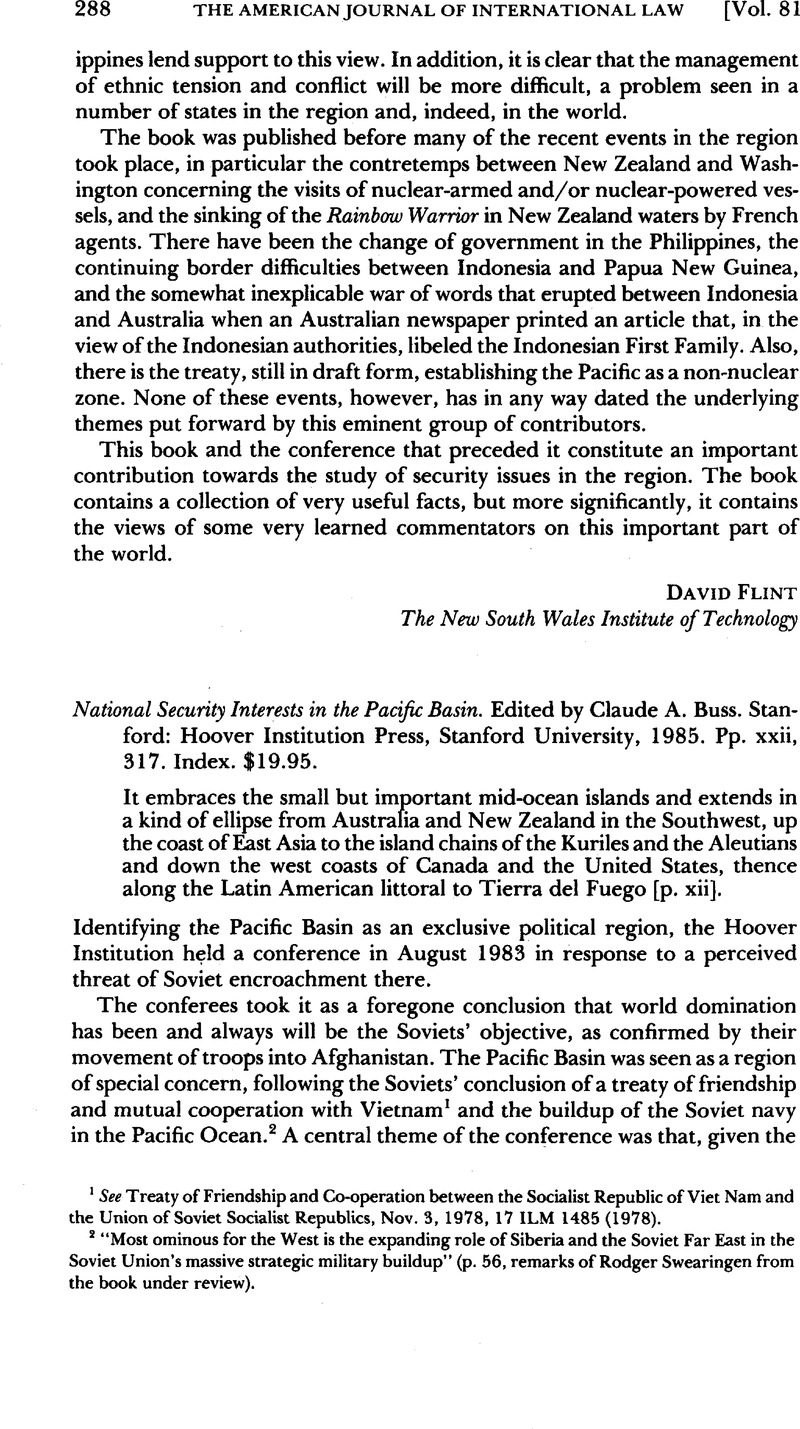No CrossRef data available.
Article contents
National Security Interests in the Pacific Basin. Edited by Claude A. Buss. Stanford: Hoover Institution Press, Stanford University, 1985. Pp. xxii, 317. Index. $19.95.
Published online by Cambridge University Press: 27 February 2017
Abstract

- Type
- Book Reviews and Notes
- Information
- Copyright
- Copyright © American Society of International Law 1987
References
1 See Treaty of Friendship and Co-operation between the Socialist Republic of Viet Nam and the Union of Soviet Socialist Republics, Nov. 3, 1978, 17 ILM 1485 (1978).
2 “Most ominous for the West is the expanding role of Siberia and the Soviet Far East in the Soviet Union’s massive strategic military buildup” (p. 56, remarks of Rodger Swearingen from the book under review).
3 But see remarks of Birabhongse Kasemsri:
[W]e should consider the relevance of other issues. These would include, first, the legal framework for avoidance of conflict and peaceful settlement of disputes within the region.
Second, the Law of the Sea could play an important role. . . . These . . . sensitive issues. . . could be potential sources of conflict. We have within the region an anomalous situation since the United States refused to sign the convention on the Law of the Sea. . . . [p. 238].
4 “The list of participants reads like a ‘Who’s Who’ of political science, strategic studies, and international relations. . . .” (p. 214, remarks of Sukhumband Paribatra).
5 At the time of the conference, a “Compact of Free Association” had already been drafted. Reprinted in 131 Cong. Rec. S15,610 (daily ed. Nov. 14, 1985). The Compact restored limited independence to two thousand Pacific islands, terminating the last of 11 trusteeships assigned to the United States as part of the general settlement ending World War II. See Trusteeship Agreement for the Former Japanese Mandated Islands, July 18, 1947, 61 Stat. 3301, TIAS No. 1665.
After the conference, in January 1986, the Compact was adopted by the United States as Public Law No. 99–239. See 132 Cong. Rec. D17 (daily ed. Jan. 21, 1986). The effective dates were established on November 3, 1986. Proclamation No. 5564, 51 Fed. Reg. 40,399 (1986).
6 P. 100 (remarks of Tadae Takubo). Also consider Yoichi Masuzoe’s remarks (p. 60): “The greater the U.S. trade deficit with Japan, the louder American business and political leaders complain that Japan is fattening its prosperity by leaving defense to the American taxpayer.”
7 “[South Korea wants] to be recognized not merely as a flank to protect Japan, but as an important adjunct” (p. 48, remarks of the editor).
8 Remarks of Henry S. Albinski, at p. 129.
9 Security Treaty between Australia, New Zealand, and the United States, Apr. 29, 1952, 3 UST 3420, TIAS No. 2493. See also the South Pacific Nuclear Free Zone Treaty, opened for signature Aug. 6, 1985, 24 ILM 1440 (1985) (already signed by Australia and New Zealand). Article 5(2) states: “Each Party in the exercise of its sovereign rights remains free to decide for itself whether to allow visits by foreign ships and aircraft to its ports and airfields. . . .” (id. at 1446).
However, Henry S. Albinski states: “Washington feels that the Darwin B–52 transit agreement with Australia as a model for ship visits to New Zealand is inapplicable, and the United States is unprepared to change the rules for New Zealand” (p. 130).
10 Association of Southeast Asian Nations Declaration, Aug. 8, 1967, 6 ILM 1233 (1967) (Brunei joined after its independence in 1984).
11 “Vietnam, as far as ASEAN is concerned, is a security sword cutting both ways. A sick Vietnam is a weakened and preoccupied Vietnam, hence less of a threat to its neighbors but also unstable and unpredictable” (p. 190, remarks of Douglas Pike).
12 “[T]he pace of national economic and social development is such as to require a concentrated and sustained commitment, particularly since time is not in our favor” (p. 236, remarks of Birabhongse Kasemsri).
13 Independence was granted by Great Britain to the Sultanate of Brunei on Jan. 1, 1984, after 96 years as a protectorate.
14 “I am . . . suggesting that [the United States] do something so that a Khomeini will not succeed Marcos in the Philippines” (p. 243, remarks of Salvador P. Lopez).
15 “How can Americans proffer advice without appearing to interfere in internal affairs?” (p. xvii).
16 But see the remarks of Birabhongse Kasemsri, supra note 3.
17 “As far as the United States is concerned, any alternative to those bases would work considerable hardship on its ability to intervene in a critical area” (p. 241, remarks of James Gregor).
18 “[Whether the PRC] can tolerate the laissez-faire administration that has fostered Hong Kong’s dynamism will be a severe test. The decline in the value of the Hong Kong dollar in 1983 suggests some lack of confidence among Hong Kong investors that the PRC can pass the test” (pp. 303–04, remarks of Ralph H. Clough).




